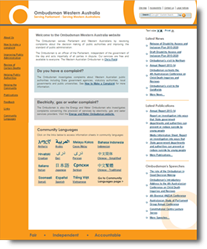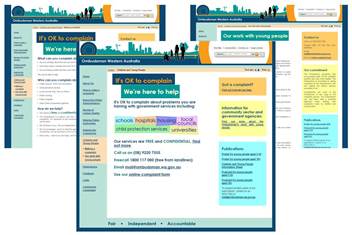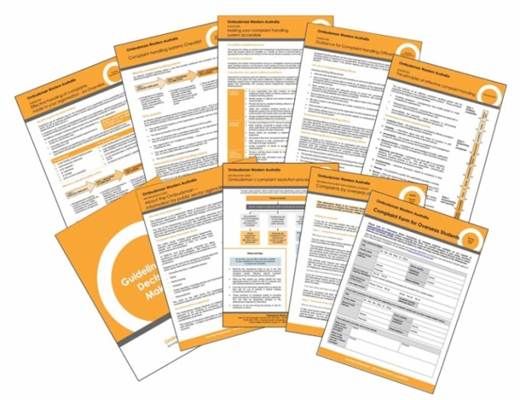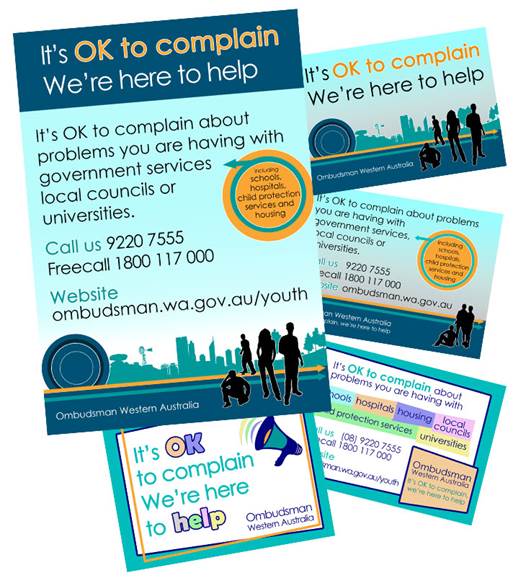Collaboration and Access to Services
Engagement with key stakeholders is essential to the Office’s achievement of the most efficient and effective outcomes. The Office does this through:
- Working collaboratively with other integrity and accountability bodies – locally, nationally and internationally – to encourage best practice, efficiency and leadership;
- Ensuring ongoing accountability to Parliament as well as accessibility to its services for public authorities and the community; and
- Developing, maintaining and supporting relationships with public authorities and community groups.
Working Collaboratively
The Office works collaboratively with local, national and international integrity and accountability bodies to promote best practice, efficiency and leadership. Working collaboratively also provides an opportunity for the Office to benchmark its performance and stakeholder communication activities against other similar agencies, and to identify areas for improvement through the experiences of others.
Integrity Coordinating Group |
Background: |
Public Sector Commission’s Induction Seminars |
Background: |
International Ombudsman Institute |
Background: |
Information sharing with Ombudsmen from other jurisdictions |
Background: |
Australia and New Zealand Ombudsman Association |
Background: |
Indonesian/ Australian Ombudsman Linkages and Strengthening Program |
Background: |
Providing Access to the Community
Communicating with complainants
The Office provides a range of information and services to assist specific groups, and the public more generally, to understand the role of the Ombudsman and the complaint process. Many people find the Office’s enquiry service and complaint clinics held during regional visits assist them to make their complaint. Other initiatives in 2015-16 include:
- Regular updating and simplification of the Ombudsman’s publications and website to provide easy access to information for people wishing to make a complaint and those undertaking the complaint process;
- Ongoing promotion of the role of the Office and the type of complaints the Office handles through ‘Ask the Ombudsman’ on 6PR’s Nightline Program; and
- The Office’s Youth Awareness and Accessibility Program and Prison Program.
Access to the Ombudsman’s services
The Office continues to implement a number of strategies to ensure its complaint services are accessible to all Western Australians. These include access through online facilities as well as more traditional approaches by letter and through visits to the Office. The Office also holds complaints clinics and delivers presentations to community groups, particularly through the Regional Awareness and Accessibility Program. Initiatives to make services accessible include:
- Access to the Office through a toll free number for country callers;
- Access to the Office through email and online services. The importance of email and online access is demonstrated by its further increased use this year from 65% to 66% of all complaints received;
- Information on how to make a complaint to the Ombudsman is available in 15 languages and features on the homepage of the Ombudsman’s website. People may also contact the Office with the assistance of an interpreter by using the Translating and Interpreting Service;
- The Office’s accommodation, building and facilities provide access for people with disabilities, including lifts that accommodate wheelchairs and feature braille on the access buttons and people with hearing and speech impairments can contact the Office using the National Relay Service;
- The Office’s Regional Awareness and Accessibility Program and Youth Awareness and Accessibility Program target awareness and accessibility for regional and Aboriginal Western Australians as well as children and young people;
- The Office attends events to raise community awareness of, and access to, its service, such as the Financial Counsellors’ Association conference in
October 2015, and Homeless Connect in November 2015; and - The Office’s visits to adult prisons and juvenile custodial facilities provide an opportunity for adult prisoners and juvenile detainees to meet with representatives of the Office and lodge complaints in person.
Ombudsman website
The Ombudsman’s website provides a wide range of information and resources for:
- Members of the public on the complaint handling services provided by the Office as well as links to other complaint bodies for issues outside the Ombudsman’s jurisdiction;
- Public authorities on decision making, complaint handling and conducting investigations;
- Children and young people as well as information for non-government organisations and government agencies that assist children and young people;

- Access to the Ombudsman’s investigation reports such as the Investigation into issues associated with violence restraining orders and their relationship with family and domestic violence fatalities;
- The latest news on events and collaborative initiatives such as the Regional Awareness and Accessibility Program; and
- Links to other key functions undertaken by the Office such as the Energy and Water Ombudsman website and other related bodies including other Ombudsmen and other Western Australian accountability agencies;
The website continues to be a valuable resource for the community and public sector as shown by the increased use of the website this year. In 2015-16:
- The total number of visits to the website has increased by 20% to 96,526 page visits compared to 80,445 page visits in 2014-15;
- The top two most visited pages (besides the homepage and the Contact Us page) on the site were The role of the Ombudsman and How to make a complaint; and
- The Office’s Guidelines on Complaint Handling and Procedural Fairness Guidelines were the two most viewed documents.
The website content and functionality are continually reviewed and improved to ensure there is maximum accessibility to all members of the diverse Western Australian community. The site provides information in a wide range of community languages and is accessible to people with disabilities.
Dedicated youth space for children and young people
In June 2016, the Office launched a new, dedicated youth space on the Ombudsman’s website. The new pages provide information about the Office specifically tailored for children and young people, as well as information for non‑government organisations and government agencies that assist children and young people. The pages also have downloadable print material tailored for children and young people.
The youth pages can be accessed at www.ombudsman.wa.gov.au/youth.

‘Ask the Ombudsman’ on Nightline
The Office continues to provide access to its services through the Ombudsman’s regular appearances on Radio 6PR’s Nightline program. Listeners who have complaints about public authorities or want to make enquiries have the opportunity to call in and speak with the Ombudsman live on air. The segment allows the public to communicate a range of concerns with the Ombudsman. The segment also allows the Office to communicate key messages about the State Ombudsman and Energy and Water Ombudsman jurisdictions, the outcomes that can be achieved for members of the public and how public administration can be improved. The Ombudsman appeared on the ‘Ask the Ombudsman’ segment in August and November 2015 and May 2016.
Regional Awareness and Accessibility Program
The Office continued the Regional Awareness and Accessibility Program (the Program) during 2015-16. Three regional visits were conducted, to the Indian Ocean Territories in May 2016, South Hedland, Roebourne and Karratha in the Pilbara in June 2016 and Broome in the Kimberley in June 2016, including such activities as:
- Complaints clinics, which provided an opportunity for members of the local community to raise their concerns face-to-face with the staff of the Office. The Office resolved many of the complaints made during the time of the visits;
- Meetings with Aboriginal community members in the Pilbara and Kimberley regions and meetings with local communities in the Indian Ocean Territories to discuss government service delivery and where the agencies may be able to assist;
- Liaison with community, advocacy and consumer groups; and
- Liaison with public authorities, including prison visits and visits to out-of-home care facilities.
The Program is an important way for the Office to raise awareness of, access to, and use of, its services for regional and Aboriginal Western Australians.
The Program enables the Office to:
- Deliver key services directly to regional communities, particularly through complaints clinics;
- Increase awareness and accessibility among regional and Aboriginal Western Australians (who were historically under-represented in complaints to the Office); and
- Deliver key messages about the Office’s work and services.
The Program also provides a valuable opportunity for staff to strengthen their understanding of the issues affecting people in regional and Aboriginal communities.
Youth Awareness and Accessibility Program
Building on a number of systems already in place, the Office began significantly improving systems to enhance access to the Office for children and young people in 2015-16, including a proactive visiting program to vulnerable groups of children in the child protection system.
In November 2015, the Office conducted a youth focus group to listen directly to young people and their representatives, in collaboration with the office of the Commissioner for Children and Young People. The youth focus group provided an opportunity for young people to be heard on ways the Ombudsman can enhance awareness and accessibility for children and young people.
Following from this youth focus group, and a range of other consultation, the Office has developed a new, dedicated youth space on the Ombudsman Western Australia website with information about the Office specifically tailored for children and young people, as well as information for non-government organisations and government agencies that assist children and young people, and a suite of new promotional materials targeted at, and tailored for, children and young people.
This year, the Office also commenced a major new visiting program to vulnerable groups of children and young people in the child protection system. This included visits to:
- The Kath French Secure Care Centre in February 2016;
- Two residential group homes in the Perth metropolitan area in May 2016;
- Two residential group homes and one family group home in the Pilbara region in June 2016; and
- One residential group home in the Kimberley region in June 2016.
The Ombudsman has also increased regular visits to the Banksia Hill Detention Centre and engagement with the community sector in the metropolitan area and regional Western Australia under the Ombudsman’s Regional Awareness and Accessibility Program.
The children and young people section of the Ombudsman’s website can be found at www.ombudsman.wa.gov.au/youth.
Prison Program
The Office continued the Prison Program during 2015-16. Four visits were made to prisons and juvenile detention centres to raise awareness of the role of the Ombudsman and enhance accessibility to the Office for adult prisoners and juvenile detainees in Western Australia.
Speeches and Presentations
The Ombudsman and other staff delivered speeches and presentations throughout the year at local, national and international conferences and events.
Ombudsman’s speeches and presentations
- The Role of the Ombudsmanto University of Western Australia Administrative Law Students in October 2015;
- Presented and chaired sessions at the Government Accountability: Law and Practice Unit at the Faculty of Law, University of Western Australia in February 2016;
- The Role of the Ombudsman at the Legal Aid Summer Series Law Day in February 2016;
- Starter Kit for New Ombudsmen and Developing or Expanding Offices at the Australasian and Pacific Ombudsman Region Conference in May 2016; and
- My Leadership Journey at the Public Sector Commission Leadership Essentials Program in May 2016.
Speeches by the Ombudsman are available on the Ombudsman’s website.
Speeches and presentations by other staff
- Presentations on the Ombudsman’s report, Investigation into issues associated with violence restraining orders and their relationship with family and domestic violence fatalities to a range of government agencies and non-government organisations;
- Presentation on the Ombudsman’s report, Investigation into ways that State government departments and authorities can prevent or reduce suicide by young people to an Australasian Evaluation Society Seminar in August 2015;
- Managing Unreasonable Complainant Conduct to senior staff at the Department of Education in August 2015;
- The Role and Functions of the Ombudsman to staff at Banksia Hill Detention Centre in December 2015 and staff at Bandyup Women’s Prison in March 2016;
- The Role and Functions of the Ombudsman to staff and visitors at the Lorikeet Centre, a rehabilitation centre for adults with a diagnosed mental illness, in Janurary 2016;
- Keeping Accountability Agencies Accountable and The Role and Functions of the Ombudsman to University of Western Australia Administrative Law Students in January and February 2016;
- The Role and Functions of the Ombudsman to Edith Cowan University Administrative Law Students in March 2016;
- The Role and Functions of the Ombudsman to Aboriginal Practice Leaders at the Department for Child Protection and Family Support in March 2016;
- Effective Complaint Handling to staff at the Department of Education in March 2016; and
- The Role and Functions of the Ombudsman to staff at Western Australian Police in May 2016.
Staff of the Office also regularly present on the role of the Ombudsman at the Public Sector Commission’s Induction to the Western Australian Public Sector seminars for public sector employees.
Liaison with Public Authorities
Liaison relating to complaint resolution
The Office liaised with a range of bodies in relation to complaint resolution in
2015-16, including:
- The Department of Corrective Services;
- The Department of Housing;
- The Department of Transport;
- The Department of Education;
- The Department for Child Protection and Family Support;
- Western Australia Police;
- The Office of the Inspector of Custodial Services;
- The Commissioner for Children and Young People;
- The Corruption and Crime Commission;
- Various universities; and
- Various local governments.
Liaison relating to reviews and own motion investigations
The Office undertook a range of liaison activities in relation to its reviews of child deaths and family and domestic violence fatalities and its own motion investigations.
See further details in the Child Death Review section, the Family and Domestic Violence Fatality Review section, and the Own Motion Investigations and Administrative Improvements section.
Liaison relating to inspection and monitoring functions
The Office undertook a range of liaison activities in relation to its inspection and monitoring functions.
See further details in the Own Motion Investigations and Administrative Improvements section.
Publications
The Office has a comprehensive range of publications about the role of the Ombudsman to assist complainants and public authorities, which are available on the Ombudsman’s website. For a full listing of the Office’s publications, see Appendix 3.

Go to next section of the Annual Report 2015-16 >>
Go to next section of the Annual Report 2015-16 >>
Go to previous section of the Annual Report 2015-16>>
Go back to Annual Reports page >>
Download the Collaboration and Access to Services section as a PDF
To read a pdf, you will need Adobe Acrobat Reader, which can be downloaded
for free from Adobe at http://www.adobe.com/products/
acrobat/readstep2.html.

